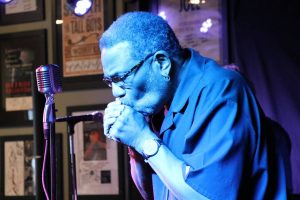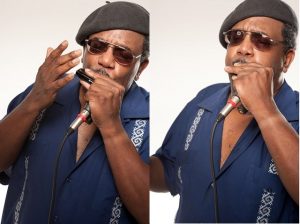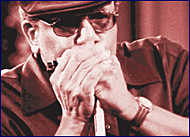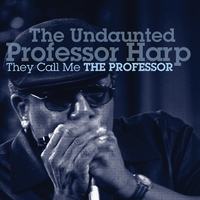Press
Listening Local: Roots Music With Professor Harp At Grumpy’s Pub
By LUKE VOSE. May 24, 2018
Boston bluesman The Undaunted Professor Harp will be performing his Texas style, no nonsense “roots music” Saturday, May 26, at Grumpy’s Pub.
After nearly five decades of playing the harmonica, undaunted is more than a moniker. In 1957 The Professor was a 1st grader discovering rock & roll, R&B and blues music. “Chuck Berry, Little Richard, Fats Domino, Elvis Presley, Jerry Lewis and a myriad of doo-wop and R&B acts were seminal influences,” he said, “A little later I got hip to Chubby Checker, which led me to Hank Ballard and Chuck Willis. A couple years later came the British Invasion. We all know that never would have materialized without black blues and R&B. The British artists influenced me, and I wound up digging deeper checking out their influences like Howlin’ Wolf, Muddy Waters and BB King.”
The Professor got his start in music as a rock & roll drummer but in 1969 he was drawn to the blues. “I was developing a black awareness, pushing 18 and I felt there was no better way to express black awareness than to embrace the blues,” he explained. He happened to see a PBS program on TV called “Mixed Bag” that featured the J Geils band one week and Muddy Waters the next. Both performances showcased the harmonica in a way that was thrilling to him. Played through an amplifier, the harmonica took on new dynamics and tones than the folkier styles he’d heard before. A Big Mama Thornton concert he attended that featured George “Harmonica” Smith sealed the deal. He was hooked on the harp.
In 1972 he had the pleasure of meeting Muddy Waters in Boston. “I was in awe,” he said. A few years later he met Waters again at a gig and this time was called on stage to sit in with him. “I refer to this incident as ‘losing my blues virginity,’ “ the Professor said. “I was invited on stage to join him several times following and even went to Chicago to join him. It was priceless.” Harp said the blues holds its staying power and world impact, due both its raw energy and finessed style. “Blues is at once the original soul music, BLM statement, parent of gospel, R&B, soul and rock & roll. It’s America’s unique classical music.”
“I’ve always said I’m at the tip of the tip of the tip of the tip of the iceberg when it comes to the blues,” said Harp when describing what drives him still after such a long career, “but simultaneously I believe I deserve more recognition and more work. That’s why I’m undaunted.”
Playing a variety of venues all over New England he said he feels particularly at home in a juke joint, and Grumpy’s Pub has that vibe. He will be accompanied by a full band comprising guitarist Tom Williams, bassist Jim Casey and drummer Al Clemens for this show.
Grumpy’s Pub on Saturday, May 26, at 9 PM—The Undaunted Professor and his band will be bringing the blues to town.
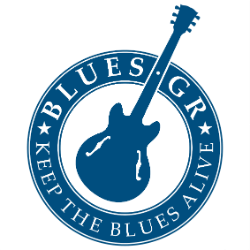
 Q&A with Hugh Holmes (aka Professor Harp) has the blues of Texas and the whole wide Delta coursing through his veins.
Q&A with Hugh Holmes (aka Professor Harp) has the blues of Texas and the whole wide Delta coursing through his veins.
Posted by Michael Limnios Blues Network on April 8, 2017 at 6:30pm
View Blog
“The Blues and the socio-racial-politico ramifications….the Blues is first and foremost the ORIGINAL protest music against a corrupt racist system in North America since at least 1619. It is and will always be Black History regardless of commercialism and/or appropriation.”
Hugh Holmes:
The Undaunted Professor Harp
Although born and raised as Hugh Holmes (aka Professor Harp) of Boston, Mass., the emanations from his harmonica and vocals make it clear that Professor Harp has the blues of Texas and the whole wide Delta coursing through his veins. The Professor was a rock ‘n’ roll drummer until ’69, when the Boston blues revival and a sterling performance he caught of blues harmonica great George Allen ‘Harmonica’ Smith, combined to lure him away from drums and into a full court press on the blues harp. “Undaunted!” he brags, by the vicissitudes of his life as blues man, front man, every kind of man, Professor Harp puts forth his commanding presence and exceptional talent, night after night. Primarily playing a sparse, yet full-sounding brand of no-nonsense, no-frills Texas style blues, Professor Harp specializes in what he calls, ‘roots music’. “It’s whatever makes me feel good and moves me, so to speak.” Indeed it has evolved while continuing to move audiences for decades.
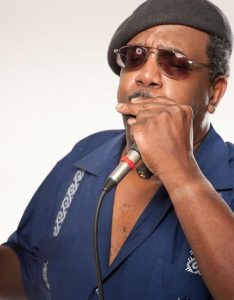
“Jazz? Deeply rooted in the Blues. Rock n Roll? I keep some Rock n Roll in MY repertoire. Muddy Waters had it pegged in his song, BLUES HAD A BABY AND THEY CALL IT ROCK N ROLL….”
Under the influence of many diverse blues greats, Professor Harp has developed a robust playing style. He often utilizes the Leslie rotating-speaker sound system to give his harp a Hammond organ timbre, while he alternately and simultaneously employs the standard or traditional ‘electrified’ blues harp. The Professor tops this off by singing the blues with an infectious fervor, supported at his strictest insistence by only top-flight musicians on guitar, bass, and drums. Professor Harp performed with various bands throughout the Northeast including legends Solomon Burke and Luther ‘Guitar Jr.’ Johnson and played live on NBC’s Today Show. Among the legions of hot performances at rocking blues clubs, the memories that often stand out for The Professor are the nights his harp helped to swell the room, in a spontaneous jam with his old mentor, the inimitable bluesman Muddy Waters. Muddy and Professor Harp was the spring of ’75 when a friend first introduced Hugh to Muddy Waters. Following his friend backstage at Boston’s Paul’s Mall, he found Muddy immersed in a game of Casino with bassist Calvin Jones. Muddy was unresponsive when it was suggested that Hughie Holmes should sit in on a few numbers. Holmes and his friend backed off. Yet, halfway through his show Muddy stopped and asked where that harp player was. The Professor was ready. Overcoming the sudden burning in his ears, Harp climbed on stage and miraculously grabbed exactly the right harmonica from his disorganized bag of harps. As usual he took the time to grease it up with Vaseline, and still jumped in without slowing down the show for a moment. From that day on Harp had a standing invitation to join in whenever Muddy took the stage. Harp says every show with Muddy was a learning experience and he cites Muddy as his greatest teacher. Muddy, in turn, called Hugh the professional of the Harp. Solomon Burke called him Professor Harmonica Holmes. After two greats anointed him with sobriquets, Hugh Holmes decided it was time to split the difference and became Professor Harp.
Interview by Michael Limnios
What do you learn about yourself from the blues music and culture? What does the blues mean to you?
Well, the Blues to ME is TRUTH. It is the original protest music against a rotten system here in America. I relates the struggles of my people to survive slavery, racial discrimination, and its by-products from the 1600’s to the present day. Therefore, I revere it. That being said, I will tell it like it is—-I AM NOT HAPPY WITH THE OVERALL STATE OF BLUES TODAY, FOR MANY REASONS. I ESPECIALLY despise today’s Blues JAMS, 1) Because they are more often than not frequented by non-Blues musicians, who think that Blues is easy to play and don’t have a love or respect for the music and 2) Nowadays, the average “Blues” bands/jammers are merely old white guys who used to play classic Rock, then stopped playing music, then 40 or 50 years later go out, playing Blues SONGS without having the right feel or knowing the right subtleties and nuances. Also, (3) a really disturbing trend shows the Blues co-opted by right-wingers. SO, you have a fanbase, a bunch of promoters and many venue owners who diametric-ly oppose the struggles of Black people; it’s a case of the “I love Black culture but don’t like Black PEOPLE”-syndrome. It’s sad. I have been regarded as an angry man in my area regarding the Blues scene, but that’s all right, because the Blues has anger in its roots. I merely speak out against injustice. Which brings us to 4)—I believe that Blacks are too-long marginalized in today’s Blues Scene. It’s much like the “Pat Boone Syndrome” of Rock N Roll of the 50’s.
What experiences in your life make you a GOOD BLUESMAN?
Well, the recent demises of Messrs. Berry and Cotton have given me more reason to pause and think. First and foremost, I believe that A good bluesman (or -woman, for thatmatter), it takes perseverance. It has taken me nearly 50 years to get just where I am NOW, though I strongly believe that I should be much further ahead. You definitely must still keep your ears open to what the old masters did, while trying to find/develop your own voice. Another necessity is to be observant of current events, ever mindful of social injustices, both being the source of material to write about.
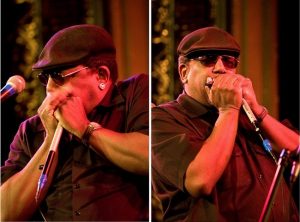
“Well, the Blues to ME is TRUTH. It is the original protest music against a rotten system here in America. I relates the struggles of my people to survive slavery, racial discrimination, and its by-products from the 1600’s to the present day.” (Photo by Michael Kurgansky)
“Well, the Blues to ME is TRUTH. It is the original protest music against a rotten system here in America. I relates the struggles of my people to survive slavery, racial discrimination, and its by-products from the 1600’s to the present day.” (Photo by Michael Kurgansky)
How do you describe Professor Harp sound and songbook? What characterize your music philosophy?
I prefer a stripped-down sound. As a matter of fact, while I’ll RECORD with extra musicians, my LIVE act is always just guitar, bass, drums and I. The way I see it, you’ve GOT to be good in order to get a full, big sound out of a skeletal band (this was rammed home to me after seeing the Fabulous Thunderbirds back in 1975). I don’t like a “cluttered” sound. Trouble IS, very few know how to pull this kind of band off. The Professor Harp sound encompasses this raw blues approach, as well as roots rock n roll and some Soul. I’ve limited my circle of players, though; as I alluded to it earlier, I really don’t like playing with rock-tinged players because you don’t hear the Blues subtleties and nuances.
Which was the best and worst moment of your career? What are some of the most memorable gigs & jams?
Significant gigs? Not too many: I’ve been able to WORK, but it’s been mostly underemployment and on the blues periphery… I DID open for BB King in 1985, though. THAT, of course was a high point. I am quite frustrated, though, because my qualifications are not properly noticed and so many of my contemporaries have enjoyed MUCH better success and it has been a real struggle for me for the last 40 years. I’m caught today in an era of dwindling Blues gigs, having MOSTLY phonies approaching me, grinning in my face, telling me that I’m awesome, yet never showing up at gigs, promising to help me get gigs, then “bagging out”, having to use mostly pickup or fill-in rhythm sections, because no one really plays in a real BAND anymore, but more like 4 or 5 different bands, which makes it very difficult to get a real polished act. I want to get to the next rung on the ladder. I am so tired of being mostly snubbed in the local work scene and the festival scene up here in New England, though the situation makes you appreciate the few supporters (and they all know who they are). I REALLY despise the cliques and politics in the scene. Fools are cutting their own throats as well as people like mine by being non-inclusive. Being more inclusive could revitalize the whole Blues scene. Going back, though, to answer your question, I guess that I’d have to say that the best times I’ve had were sitting in with Muddy Waters.
Which meetings have been the most important experiences for you? What is the best advice ever given you?
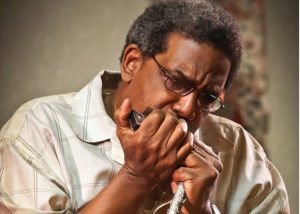
“Differences between drumming and harmonica playing—I would say BOTH require a good bit of stamina, as well as a good sense of time. It’s hard to say, though, about the secrets of harmonica playing, save the needs for tone, feeling, technique, and DESIRE.”
The most important meetings for me (in no particular order)—my meeting George “Harmonica” Smith, whose sound and style is my biggest influence/original inspiration, then 6 years later, being introduced to Muddy Waters, meeting Solomon Burke, jamming with HIM, soon receiving my title from him (“Professor Harmonica Holmes”, which I soon abbreviated to Professor Harp). Funny you’d mention Luther Johnson, because I 1st jammed with Luther “Snake” Johnson here in the Boston area and then later with Guitar JR.- Luther Johnson with Muddy’s band back in ’75.
“Differences between drumming and harmonica playing—I would say BOTH require a good bit of stamina, as well as a good sense of time. It’s hard to say, though, about the secrets of harmonica playing, save the needs for tone, feeling, technique, and DESIRE.”
Which memories from the late great bluesman Muddy Waters makes you smile?
I guess I’d have to say that most of the memories make me smile, at least the early ones. I really enjoyed being onstage with Muddy, whenever he came to my neck of the woods and even better when I went to visit him in Westmont, Illinois. I remember how down-to-earth Muddy was—as soon as I and my buddy dropped in, he offered us salami sandwiches. Visiting him, we sat in his kitchen, shooting the shit, talking about the Blues—and here I will be describing a surreal moment—Muddy’s kitchen was in the rearmost part of the house. Between it and the front vestibule/alcove was the den, or small living room. Anyhow, where I was sitting in Muddy’s kitchen, I could see the TV well. I saw his grandkids watching the TV, but they were fighting over which program to watch. Well naturally, the noise level escalated so Muddy in his big booming voice bellowed out for quiet. When I looked up, I saw what was playing on the TV—it was THE PARTRIDGE FAMILY! What a mind-blower! “The Partridge Family” in the home of Muddy Waters! If THAT isn’t surreal, I don’t know what is! Muddy was always cool; during that kitchen bull session he told me “You gon’ be a baaad harp player!” I never forgot it…
Are there any memories from your rock ‘n’ roll era in Boston which you’d like to share with us?
I can’t really say much about my rock n roll drummer days because of the fact of lack of success in putting together a cohesive band, let alone working with one. I would say that my days from 67 through 72 were the beginning to ongoing frustration. Even during my pre-roots music days I could never find the right mix of players, so the bands (if you want to call them that) never progressed beyond a couple of sessions in my parents’ garage. The frustration really began to grate on me because I looked at music as my escape, because I was forced to work in my father’s business selling fruit and vegetables, which albeit somewhat enjoyable from the age of 10 to about 14 ½, when it became increasingly boring. So being forced to work in a job I hated during the summer 7 days a week, about 14 hours a day and often after school, the problems finding musicians for a group caused me to become very angry. Mind you, this is a time BEFORE I got hip to the Blues; I would say that this stage in my life was 66 thru 69, my high school days. The frustration only increased, once my musical tastes evolved toward the Blues, because very few people, as today, had a real appreciation for the music. But I struggled on until around 73, when a few things began to develop.
What are the “differences” between a drummer …and harp player? What are the secrets of harmonica?
Differences between drumming and harmonica playing—I would say BOTH require a good bit of stamina, as well as a good sense of time. It’s hard to say, though, about the secrets of harmonica playing, save the needs for tone, feeling, technique, and DESIRE. I think having the actual desire to play the instrument is 3/4s of the battle. (Photo by Ron Rudy)
“Jazz? Deeply rooted in the Blues. Rock n Roll? I keep some Rock n Roll in MY repertoire. Muddy Waters had it pegged in his song, BLUES HAD A BABY AND THEY CALL IT ROCK N ROLL….”
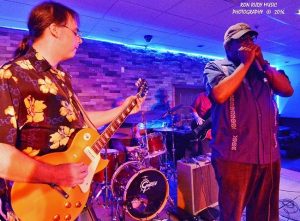
“Jazz? Deeply rooted in the Blues. Rock n Roll? I keep some Rock n Roll in MY repertoire. Muddy Waters had it pegged in his song, BLUES HAD A BABY AND THEY CALL IT ROCK N ROLL….”
What do you miss most nowadays from the blues of past? What are your hopes and fears for the future of?
I worry for the future of the Blues, for many reasons aforementioned. But then again, I worry for the future of the WORLD. The worldwide shift to the Right in My Country, YOUR country and many others is a bad sign. I hate the slippery slope toward fascism. Countries are better off when run from the CENTER, in my honest opinion. The OTHER edge of the sword—A LOT MORE BLUES SONGS WILL BE WRITTEN. What I DO really miss is the traditional electric Blues sound. It’s altogether too rock-tinged and flashy lead guitar oriented. BUT—there ARE some rays of hope. I have no problems with diversity, but it is young (at least compared to ME) black guys like guitarists Jontavious Willis, Marquise Knox, harpist Andrew Ali and others all serve to give me hope. I MUST keep some for myself, also.
What are the lines that connect the legacy of Blues with Soul and continue to Jazz and rock ‘n’ roll music?
Well, SOUL music is also known as R and B, or Rhythm and Blues. Normally I would say “enough said”, but I DO think that it is time for a return to the roots, time to put the “B” back in R and B. it correlates to the way what is touted as Country music is so far away from the roots. Jazz? Deeply rooted in the Blues. Rock n Roll? I keep some Rock n Roll in MY repertoire. Muddy Waters had it pegged in his song, BLUES HAD A BABY AND THEY CALL IT ROCK N ROLL….
What is the impact of Blues music and culture to the racial, political and socio-cultural implications?
The Blues and the socio-racial-politico ramifications….the Blues is first and foremost the ORIGINAL protest music against a corrupt racist system in North America since at least 1619. It is and will always be Black History regardless of commercialism and/or appropriation. While many of the physical milieus have changed (as I might have said earlier, I don’t sing about picking cotton), there are still many problems here in the US and around the world that I CAN sing about—the institutional racism, the MODERN-DAY slavery which is the prison system, the state of perpetual war with world holocaust perpetually on the horizon, this tragic joke of a Presidency, the everyday struggle to stay alive, conflicts in romantic relationships and/or marriages. Yes, sir, there still are plenty of subjects to sing the Blues about.
Let’s take a trip with a time machine, so where and why would you really want to go for a whole day?
If it WERE possible to travel back in time, as an OBSERVER, as opposed to a PARTICIPANT (wouldn’t want to/couldn’t alter the course of history, y’know), I think it would be quite fascinating to see some of the Blues masters in their younger days develop their sounds and styles. The Walters, Muddy, the Kings, Elmore James, Jimmy Rogers, Otis Rush, Little Milton, John Brim, Fred Below, and countless other locals would be honing and exhibiting their crafts. FASCINATING AND PRICELESS!
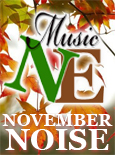 Music Review:
Music Review:
By A J Wachtel – The Noise on November 1, 2015
The Undaunted Professor Harp®
They Call Me The Professor
10 tracks
I really like the way the Professor plays a lot of fluttering notes. It”s really cool how when you least expect it he”s fluttering away on a note when he solos. And his vocals are believable too. His voice sounds like it drips with experience and he”s not just singing the words. This combination forms his music”s formidable foundation and his great band supplies the rest. Marty Ballou and John Packer play bass, Tom Ferraro is on guitar with Glen Hardy on piano. Mark Texeira from Duke Robillard”s band and Mike LaBelle are drumming and Doug James is blowing sax. They”re a great band playing great music. From the Memphis shuffles “They Call Me The Professor,” “That”s What You Do To Me,” and “Fighting The Battle” to the cameo of Brookline native and Muddy Waters band vet Steady Rollin” Bob Margolin on “My Life: An Exercise In Blue,” this band plays with passion and pleasure. I also really dig the jazzy “It Just Comes Natural” with the Chuck Berry leads. And check out the slow blues closing cut “Eine Fur Herr Schmidt,” the Professor”s tribute to his mentor George Harmonica Smith. On this cut he plays a chromatic harp. Another treat is his remake of the “60s instrumental the Rocking Rebel”s classic “Wild Weekend,” where he changes everything and makes it a harp song. It”s first rate red hot and blue music.
(A.J. Wachtel)
 Living Blues
Living Blues
Professor Harp Undaunted
By Leslie Hassel, August 2014
With unrivaled determination, a boisterous and full-bodied style, and a music career spanning four decades, Hugh Holmes has earned the nickname “The Undaunted Professor Harp®.” One of New England’s premier harmonica players, Professor Harp has a simple approach: just keep playing.
Born in Boston, Massachusetts, on November 4, 1951, Holmes has lived in the Boston metro area since birth. At age ten, his father saw economic opportunity in Bridgewater, Massachusetts, located about 30 minutes south of Boston. As an adolescent in Bridgewater, Holmes gained a cultural awareness that eventually led him to pursue the blues.
“My folks didn’t expose me to the blues,” he said. “They came from what I call the North-South-Virginia and North Carolina. And the areas from where we came didn’t have a lot of the blues like you hear in Mississippi or Texas or Georgia or someplace like that.” Instead, the percussionist stylings of Gene Krupa and Cozy Cole perked Holmes’ young ears, and he began playing drums as a teenager. “But more and more my ear was moving toward listening to the blues,” he says.
Holmes came of age during the Vietnam War, and he struggled to find a place as a black male who resisted the United States military campaign in Southeast Asia. Holmes looked inward, turning to blues music as an entry point to black identity. “At the time a lot of the people were right wing and they were for the war, and I turned against it. So let’s just say I wasn’t really a comfortable fit.
I figured, what better way to get black awareness than to listen to the blues?”
As a young man, Holmes frequented Boston-area music venues, and it was here that he lost his “blues virginity.” In 1969 he caught a show at the Boston Tea Party with harp players George Smith, Rod Piazza, and Big Mama Thornton, and that became a turning point in his life. “That was the thing that got me into playing the harmonica. Rod Piazza was playing a harmonica boogie, and the biggest thing was seeing George Smith, who is my biggest influence even now.
 “The thing about it that really blows my mind even now is I was leaning on a car with George Smith, and I didn’t know who he was. [laughs] We were waiting for the line to get down a bit, and this older black gentleman came in and said, ‘How you doin’, little brother?” But I didn’t know who he was. Then he went on the stage and picked up the harp and started playing. Oh man!
“The thing about it that really blows my mind even now is I was leaning on a car with George Smith, and I didn’t know who he was. [laughs] We were waiting for the line to get down a bit, and this older black gentleman came in and said, ‘How you doin’, little brother?” But I didn’t know who he was. Then he went on the stage and picked up the harp and started playing. Oh man!
“I never heard electric harmonica before then, and it just gave me chills down my spine. I saw George and said, man, I gotta pick this up.
“Another turning point came when a friend of mine introduced me to Muddy Waters when I was about 24. This was a time when Muddy would do matinées over at a place called Paul’s Mall in midtown Boston. He knew Muddy and so one April afternoon I went over there.
“My friend introduced me to Muddy and said, ‘Hey this is Hugh, and he’s gonna play some harp for you.’ And Muddy didn’t say nothing. And the next thing I know I’m hearing Muddy say, ‘Hey you, come on up.’ And all of a sudden I’m playing with Muddy Waters.
“It got to the point where every time he [Muddy] would come to town he would invite me to play with him. And I picked up more chops and more confidence, because you’re basically sitting at the feet of the master.”
Holmes’ acquaintance with Muddy led to musical collaborations with other well-known musicians, and it was during one such performance that Holmes received the moniker from which Professor Harp emerged.
“Back in those days I used to wear these gold rimmed glasses. So [Solomon] Burke started calling me Professor Harmonica Holmes. and when an R&B icon gives you a nickname you gotta take it. So I just shortened it to Professor Harp and that’s the way it’s been.”
Playing next to artists such as Muddy Waters and Solomon Burke helped Holmes gain the drive and poise to assemble his own bands, and in the late 1970s he began seeking blues musicians in the Boston area for various projects. Holmes met difficulties in both finding local musicians and building a fan base.
“You don’t get that much black support,” says Holmes. “And that’s a shame because for the most part, blacks threw the blues away. For reasons that aren’t really true. Because the same social factors still exist today, the only difference is it’s a little bit more sophisticated.
“There are enough social factors to keep the blues alive and the black community should realize that. Just the everyday struggle to stay alive. Problems with the old man or old lady. Money problems. You name it. The blues are still here. We’re always fooling ourselves when we say we’ve outgrown the blues or we’ve evolved from it.”
Despite the challenges presented to Holmes, he continues to push forward. “I keep going. That’s why they call me “The Undaunted Professor Harp®,” he says. “Because I don’t stop. Once it gets in your blood, it’s hard to stop.”
To keep his feet wet, Holmes performs frequently in New England, and he is currently building a network in the Southeast. In late May, he joined fellow harpists Hurricane Hawk and Steve Scott in a Harmonica Blowout at the Myakka River Blues Festival in Venice, Florida.
Professor Harp’s album, They Call Me Professor, showcases an impressive cast of New England musicians, including Tom Ferraro, Bob Margolin, Keith Munslow, and the late John Packer. The album received positive reviews and increased Professor Harp’s exposure to the blues audience, but he is always looking for new ways to connect with listeners.
Above all, Holmes’ goal is to continue bringing the blues to the people. I’m just doing the best I can to keep the blues alive.”
Music Review:
Posted by Bman- Bman’s Blues Report Monday, March 26, 2012
New Release: They Call Me The Professor – Professor Harp
I just received the new release from Professor Harp, They Call Me The Professor, and I really like it. The title track, They Call Me The Professor has that unmistakable Texas lope and has really great harp tones throughout. The Professor has a great blues voice as well. Track two, Texago at Doyle’s is a screamin harp instrumental that really cooks. Next up is Marty Robbin’s Sugaree. The Professor takes the lead on vocals and there is a real solid guitar solo to keep the barrelhouse style blues crankin. Of course there is a harp solo… and I gotta say the guy can play. Fightin’ The Battle is a cool soul tune which is a great number for this lineup with an interesting keys solo by Keith Munslow. It also shows that the Professor can carry the vocal duties with ease. What You Do To Me features Glen Hardy on boogie piano and the Professor delivering a great rendition of the Del Gordon track. There is also a sweet bari sax solo on this track by Doug James that I must comment is really in the groove. Wild Weekend has a 60’s vibe but it a harp driven track with a cool guitar riff by Tom Ferraro and demonstrating the bands versatility. Sly Black Fox is a nice slow Texas blues with a great dragging lope and the Professor take the opportunity to blow it out. My Life: An Exercise In Blues is a slow blues with smokin’ slide work by Steady Rollin Bob Margolin. The Professor continues to demonstrate his vocal and harp consistency keeping the sound of each song fresh. Both Bob and the Professor get the chance to demonstrate their own individual prowess on their instruments. It Just Comes Natural is a jazzy little tune along the lines of Gatemouth or Louis Jordan. The band demonstrates throughout that they are tight and ready for just about anything. The final track on this cd, Eine Fur Herr Schmidt is a nice slow number featuring the Professor on Chromatic harp.
I gotta say that although this cd sounds like it was recorded 50 years or more ago because of it’s authenticity, it sounds fresh and new. I highly recommend it for anyone who loves the beginnings of the electric blues. This recording is topps!
Voted “Outstanding Harmonica Player 2 Years Running ”
in the 15th Annual Blues Audience Readers Poll 2011!

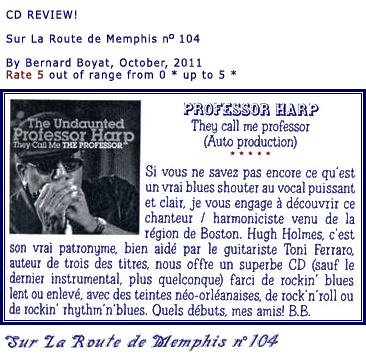
Living Blues
The Undaunted Professor Harp® They Call Me THE PROFESSOR
By Jim DeKoster, August 2011
The Undaunted Professor Harp® – (No#)
Boston’s Hugh Holmes was a Gene Krupa-inspired drummer until 1969, when an encounter with George Smith left him so enamored of the harmonica that he sat In with Muddy Waters in the mid-70s and assumed his current stage name from nicknames bestowed on him by Waters and Solomon Burke. Now, after some 35 years of gigging around Boston and the northeast, he finally has a debut recording to offer.
The Smith influence is immediately apparent in Holmes’ huge sound, which gets its fullest expression on the closing instrumental tribute to his mentor, Eine Fur Herr Schmidt, on which it sounds like he’s running the sound from his chromatic harp through a Leslie rotating speaker for added effect For the most part, however, the program stays uptempo, as on the opening title track, the Little Walter-influenced romp Texago at Doyle’s and a take on Sugaree that owes more to the Hank Ballard version than to composer Marty Robbins’ original, and there are tastes of jump blues on What You Do to Me, jazz on It Just Comes Natural, rock ‘n’ roll on Wild Weekend, and Texas/Louisiana blues on Sly Black Fox. Fightin’ the Battle is an atmospheric but pointed lament on racial struggles penned by guitarist Tom Ferraro, while Bob Margolin’s slashing slide guitar licks recall Waters on Holmes’ own My Life: An Exercise in Blue, Other familiar names among the bandsmen include baritone saxophonist Doug James, bassist Marty Ballou and drummer Mark Teixeira (the Duke Robillard sideman, not the Yankee first baseman).
Throughout, The Undaunted Professor Harp® proves himself to be a self-assured, powerful singer and player, You can mark this one down as a debut recording that deserves a sequel.
—Jim DeKoster
Courtesy: www.livingblues.com
![]() Music Review:
Music Review:
By Don DiMuccio – Motif Magazine – MotifMagazine.net on July 20, 2011
Undaunted. The dictionary defines it as “not discouraged; not forced to abandon purpose or effort.”
To any New England fan of harmonica driven blues, the word has become synonymous with Hugh Holmes, a.k.a. The Undaunted Professor Harp®, who summers on our local stages. This perennial performer’s monolithic presence and equally behemoth sound defines him as one of the few unyielding hardcore bluesmen left on the circuit today. How he acquired his moniker from music legends Muddy Waters and Solomon Burke has evolved into the stuff of lore. But make no mistake about it, Professor Harp is not some alter ego by any means. It is the embodiment of an uncompromising rhythm and blues stalwart, who has graced just about every area venue equipped with a stage and a liquor license. ‘
With such a protracted and accomplished career under his belt one might be led to believe that his new CD, They Call Me The Professor, is merely the latest in a string of recordings. In all actuality this collection marks the Professor Harp’s first mass release in his 30-plus year career. And for the occasion, Harp received more than just a little help form his friends, assembling a cadre of powerhouse players such as Doug James (Roomful of Blues), Bob Margolin (Muddy Waters, Mike Labelle (Young Neal & the Vipers) and the late John Packer.
However, no musician played more key a role in the overall tone of the project — aside from The Professor himself — than blues guitarist extraordinaire Tom Ferrao, who served additional duties as producer, writer and benevolent Svengali.
The album opens with the title track, a heavy 4-on-the-floor hard driving shuffle know in the blues idiom as a “march” beat style. the song itself is basic standard blues fare, with some predictable lyrics that won’t have Paul Simon losing any sleep tonight: “They call me the Professor, time for you to go to school – Gonna put you in my classroom, teach you all about my rules…”
However, Professor Harp’s bellowing vocal style and tasty harmonica punctuation make the groove so irresistibly cool that it wouldn’t matter if he was singing the listings out of the White Pages!
Although much has been said about Harp’s penchant for Texicago style blues, he also has a deep love for roots rock “n” roll, a fact abundantly evident in his complete reworking of the Marty Robbins tune “Sugaree.” In the same vein, his cover of The Rockin’ Rebels’ surfrock romp “Wild Weekend” injects some harmonica into a traditionally guitar-dominate genre, that even 10 Dick Dales couldn’t beat.
Cover songs aside, of the 10 tracks presented, the original entitled “Fightin’ The Battle” proves to be the standout of the bunch. A raw, heartfelt slow blues, the obviously deeply personal song demonstrates a surprising vulnerable side to Professor Harp. “I wake up in the morning. Its never far behind. They all fear a black man with a solid mind – They all smile and say hello, but deep down they’d love to see me gone… People talk equal opportunity but don’t try selling that to me – You try to rent a home for your family, the landlord takes one look at you ‘sorry no vacancy.'” With the kind of gut wrenching honesty rarely found in the blues world today, “Fighting The Battle” succeeds where the aforementioned title track failed. When an artists share that suppressed part of themselves otherwise hidden away from the world, the artist connects with the listener. And connect Professor Harp does.
On “Eine Für Herr Schmidt,” Harp spotlights his trade mark swirling mouth-organ and ever-so-slightly psychedelic. This signature harmonica sound along with his sometimes pontifical vocal style does “They Call Me The Professor” an accurate representation of Professor Harp’s entire career. Despite changing public tastes, clubs going in and out of business, and even the CD producer’s untimely passing mid-project, Professor Harp endures. He remains one of the last true blues purist and as always he remains UNDAUNTED.
Follow this link for a printable version of this article (PDF).
Music Review:
By Don DiMuccio – Motif Magazine – MotifMagazine.net on July 20, 2011
The Undaunted Professor Harp® Rules the Blues
Undaunted. The dictionary defines it as “not discouraged; not forced to abandon purpose or effort.”
To any New England fan of harmonica driven blues, the word has become synonymous with Hugh Holmes, a.k.a. The Undaunted Professor Harp®, who summers on our local stages. This perennial performer’s monolithic presence and equally behemoth sound defines him as one of the few unyielding hardcore bluesmen left on the circuit today. How he acquired his moniker from music legends Muddy Waters and Solomon Burke has evolved into the stuff of lore. But make no mistake about it, Professor Harp is not some alter ego by any means. It is the embodiment of an uncompromising rhythm and blues stalwart, who has graced just about every area venue equipped with a stage and a liquor license. ‘
With such a protracted and accomplished career under his belt one might be led to believe that his new CD, They Call Me The Professor, is merely the latest in a string of recordings. In all actuality this collection marks the Professor Harp’s first mass release in his 30-plus year career. And for the occasion, Harp received more than just a little help form his friends, assembling a cadre of powerhouse players such as Doug James (Roomful of Blues), Bob Margolin (Muddy Waters, Mike Labelle (Young Neal & the Vipers) and the late John Packer.
However, no musician played more key a role in the overall tone of the project — aside from The Professor himself — than blues guitarist extraordinaire Tom Ferrao, who served additional duties as producer, writer and benevolent Svengali.
The album opens with the title track, a heavy 4-on-the-floor hard driving shuffle know in the blues idiom as a “march” beat style. the song itself is basic standard blues fare, with some predictable lyrics that won’t have Paul Simon losing any sleep tonight: “They call me the Professor, time for you to go to school – Gonna put you in my classroom, teach you all about my rules…”
However, Professor Harp’s bellowing vocal style and tasty harmonica punctuation make the groove so irresistibly cool that it wouldn’t matter if he was singing the listings out of the White Pages!
Although much has been said about Harp’s penchant for Texicago style blues, he also has a deep love for roots rock “n” roll, a fact abundantly evident in his complete reworking of the Marty Robbins tune “Sugaree.” In the same vein, his cover of The Rockin’ Rebels’ surfrock romp “Wild Weekend” injects some harmonica into a traditionally guitar-dominate genre, that even 10 Dick Dales couldn’t beat.
Cover songs aside, of the 10 tracks presented, the original entitled “Fightin’ The Battle” proves to be the standout of the bunch. A raw, heartfelt slow blues, the obviously deeply personal song demonstrates a surprising vulnerable side to Professor Harp. “I wake up in the morning. Its never far behind. They all fear a black man with a solid mind – They all smile and say hello, but deep down they’d love to see me gone… People talk equal opportunity but don’t try selling that to me – You try to rent a home for your family, the landlord takes one look at you ‘sorry no vacancy.'” With the kind of gut wrenching honesty rarely found in the blues world today, “Fighting The Battle” succeeds where the aforementioned title track failed. When an artists share that suppressed part of themselves otherwise hidden away from the world, the artist connects with the listener. And connect Professor Harp does.
On “Eine Für Herr Schmidt,” Harp spotlights his trade mark swirling mouth-organ and ever-so-slightly psychedelic. This signature harmonica sound along with his sometimes pontifical vocal style does “They Call Me The Professor” an accurate representation of Professor Harp’s entire career. Despite changing public tastes, clubs going in and out of business, and even the CD producer’s untimely passing mid-project, Professor Harp endures. He remains one of the last true blues purist and as always he remains UNDAUNTED.
Follow this link for a printable version of this article (PDF).
CD Review
Bill Copeland Music News
Professor Harp bares his soul on debut CD They Call Me The Professor
By Bill Copeland on June 11, 2011
Professor Harp’s debut CD introduces the veteran Boston singer-harmonica player with its cool title, They Call Me The Professor. And “professor” is a title Hugh Holmes has earned. Muddy Waters, during a Boston gig, called Holmes “the professional of the harp” and Solomon Burke, when he too was in town, called Holmes Professor Harmonica. With those accolades from those legends, it made sense for Holmes to combine his monikers into one easy to remember nickname.
Of course, Holmes has been displaying his musical credentials in the greater-Boston area for several decades. He has made himself a popular staple in the local blues scene, well-respected by critics and fans, feared by some music business types who made the mistake of trying to do him wrong.
The most striking song on They Call Me The Professor is “Fightin’ The Battle,” a tune written by Holme’s guitarist Tom Ferraro but inspired by the professor’s life story. Not only does the song reflect Holme’s frustrated rage with the racial injustice he has obviously suffered, it expands thematically into an expression of the tortured soul of black America.
“Fightin’ The Battle” waltzes majestically in like a bucketful of soul and blues carried by icy cool piano melody, a determined rhythm section, and heavy drops of nimbly picked guitar notes. Holme’s electric harp here can match the powerful timbre of a B3 and his voice, heavy with emotion, carries a lifetime of scars within its richness. The song, at once beautiful and harsh, reaches the level of poetry in its direct language and frank scenarios of racial discrimination. No wonder the professor has so much fire in his belly.
Opening title track “They Call Me The Professor” is another Ferraro-penned original that captures the ideas and voice of Holmes. This track is chock full of Professor Harp’s rich low tenor as well as his huge aural melodic structure on harmonica. It is just the way his heavy harp melody cruises over the bopping rhythm section that makes you go, “cool.”
A Holmes instrumental original “Texago At Doyle’s” will be familiar to longtime fans of the professor’s live shows. It’s got a fun, dance-able, driving beat that keeps it moving in solid momentum. The professor blows a storm of notes all the way through, like he has something he wants to get off his chest, and he expresses it with huge, heavy gusts of chords.
“Sugaree,” contributed by Marty Robbins, is structured around nifty stop-start rhythms, and that motion keeps the guitar rocking, its lightning strikes of blistering notes setting the bridge aflame. Drums and bass play almost faster than the feet can dance to it, and Harp comes in with his hefty drawling vocal then his speedy, three-dimensional hurricane of notes. You feel like you’re caught in the perfect storm of blues instrumentation. Not for the faint of heart.
Holmes chills a little on Del Gordon’s tune “What You Do To Me.” This mid-tempo oldies rocker allows the professor to showcase his beautifully rich vocal abilities. His timbre is so full of emotion in its big, round roughness. Just close your eyes when you’re listening to this one, and you’ll hear shades of all the wonderful voices of yesteryear, Otis Redding, Sam Cooke, and more blues singers than you can possibly imagine in one sitting. The professor’s influences are quite clear. Yet, you also hear the distinctly personal touch of Holmes. His personality far too strong to settle for copycatting, he forges something heavy, new , and muscular with his amicable vocal vibe.
“Wild Weekend” can best be described as early 1960s surf-rock ala harmonica. With the harp subbing for Farfisa organ, popular in the day of Jan And Dean, the professor shows his musically lighter side. I’m not sure if Holmes was ever a surfer, but he certainly has a handle on the music associated. This one just rocks right out with an early 1960s vibe that conjures images of teenagers jumping out of their convertibles and racing to the water, board in hand.
Holmes shows a lot of vocal character in his co-written piece “Sly Black Fox.” The professor sings this one in a voice from the low register, and it is spiked with a toughness you don’t always hear in roots music. Don’t get wrong. The soul and the magic is certainly part of the blend. But the professor really rips it up with emotive vocal sustains in this particular approach. His harmonica playing here has a melodic fullness usually associated with baritone sax. He just makes those notes groove around at a pace he defines within the attitude of the story he is singing.
Holmes wrote his life story song called “My Life: An Exercise In Blue.” Here, the professor sings about his own long life by enriching it with a comparative to young men killed in overseas war, dead before they got a chance to build themselves up into something special. The harp is low and grooving here. It is chromatic, slow blues, and the professor grinds it out with the hip attitude and cool precision of a lead guitar player in an R&B band. Thick, zesty harmonica notes swirl around like joyful madness and keep the ears glued to every note within their multi-faceted textures.
“It Just Comes Natural” pops into our attention when Tom Ferraro’s lead guitar notes spike in and out of Keith Munslow’s loungey piano stride. From this melodic structure comes Holmes’s wonderfully smooth tenor voice. The professor is all class here, increasing the warmth of the chorus with each line. This is pure rock and roll in a solid 1950s vein.
Holmes closes out his CD with an ode to his idol, the late George Harmonica Smith, which is fitting, naturally, as Holmes is big enough to point out his debt to the key players who came before him. Respect is something hard to earn from someone as tough-minded as Holmes. Yet, here he is, undaunted, showing his appreciation for an earlier legend, giving it his all on his electric, layers of chromatic notes rising up and cascading, tasty dollops of colors and tones moving around like brush strokes creating a masterpiece.
There is much on They Call Me The Professor for any blues, rock and roll, and roots fans to sink their teeth into. Professor Harp is clearly a complex man and a complex musician, and he shows his many different musical and personal shadings on this debut CD.
Courtesy: www.billcopelandmusicnews.com
Music Review:
By Bill Copeland – Bill Copeland
Music Newson September 27, 2010
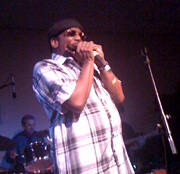
Professor Harp brought his personal fire to Smoken’ Joe’s
Hugh Holmes calls himself The Undaunted Professor Harp®. And not without good reason. Holmes is fearless enough to stretch his repertoire outside of the blues and he knows as much about blues and harmonica to write a Ph. D dissertation. Last Saturday night’s show at Smoken’ Joe’s Cafe© in Boston’s Brighton neighborhood was no exception. Professor Harp chooses only the best locations to plays his music, and the small but full of character restaurant was a perfect vehicle to launch his rockets.
Harp and his band opened with “Shake Dance” and the rhythm section of drummer Mike Labelle and bassist Bruce Thomas kept it tight underneath the Professor’s chock full of thick, blues-drenched harmonica lines. He moved those notes around like nobody’s business. Whether cruising with the groove or sailing over it with a melodic phrase, Harp was in control, putting his personal oomph into each number.
He sang with his own inimitable style the jump number “I’m Trying” while guitarist Tom Williams was bouncing his guitar licks all over. Harp used his electric harmonica on it and the wired mouth organ had a full Wurlitzer swirl going on. Next up was Slim Harpo’s “Sam.” Harp and his boys went into a groove just shy of funk. A flow of harp notes blew over that groove and his band did him justice. The rhythm section kept it tight, lively, and in motion by putting their thumps in all of the right places. Speaking of right places, Harp would slithered into those tight spaces within the groove before stepping out with a sly melody line.
Harp jumped into some material outside of the blues but he kept it in the framework of 1950s radio. Chuck Berry style guitar riffs and rockabilly beats and a little bit of twang turned “Just Want To Get To Know You” into something that made you picture a young man driving around in his father’s DeSota.
On the mellow, down tempo blues numbers, “Black Night,” Harp brought the notes up from some place deep. His Wurlitzer sound again coming out of that little mouth organ. The rhythm section locked it down with a meaningful bop on this tale of mournful loss. Williams stabbed into it with incisive cool notes, digging into it with feeling by unleashing quick, quirky guitar spikes. Intense applause erupted for the guitar man.
Harp made his harmonica sound like a Hammond on Bobby Rush’s “Chicken Heads,” a blues tune with a dance-able beat while the gee-tar did its thing on some subtle high notes, counterpoint to the mouth organ. People there were doing a funky dance in their chairs to the soulful, guitar riffs. Slim Harpo’s “King Bee” got a hefty dose of beat as the rhythm section treated this simple one to a dose of meaning, widening it up and adding in plenty of color and tone. Harp’s electric mouth organ getting an edge with a focus on the second and fourth accents in each meter.
Original tune “Every Day Every Night” featured some of Harp’s most killer harmonica playing of the evening, and, he kept the tune grooving’ and sunny even though his playing was at its most serious. Bo Dudley’s “Pretty Thing” gave the Professor a chance to strut some more wanky stuff, squeezing the juice out of his instrument, making it moan with organish sound.
Another Harp original “Texago At Doyales” found the band getting riffier and their sound matched the song title, swampy beats coming on strong. The second half of the show was even better. Professor Harp was actually outside the front door saying goodnight to some patrons while the other ¾ of his band started things up with an instrumental. The band, without the professor, were in top form, and it was cool to see what they had to offer. The magic continued when Harp came back in to join them for a lot of riffing on the Link Wray number “Rumble.”
“Just Come Natural” gave the good professor a chance to show off an original from his upcoming CD. The song was pure blues rooted in the 1950s period. The call and response chorus was well-written and catchy as hell, and Williams let loose a hot, brittle lead guitar solo here. “Just Come Natural” will probably be a hit on blues radio. The Professor wailed the tar out of Ray Charles’ “What I Say,” using, of course, his electric harmonica to keep the song sounding busy, layering all of those golden notes over the beat. His band was slamming it home behind him. They jammed on this classic nugget, making it fun for the crowd and much longer than what would’ve made it onto radio back in the day.
Harp and his boys went through more classics as the evening went on. Little Walter’s “Oh, Baby,” Al Green’s “Take Me To The River,” and Elvis Presley Vegas staple “Polk Salad Annie” got the Professor Harp treatment. The Professor is also quite a crooner and his voice sizzled on Magic Sam’s “I Have The Same Old Blues,” making you appreciate what he brings to song even more.
Harp closed out with what he calls his “Wilson Pickett” trilogy, a medley of “Engine Number Nine,” “Hey, Hey, Hey,” and “Three Time Loser,” all sung and harped in the Professor’s inimitable style, soulful voice, heavy groove, and a lot of pretty, bluesy melodies.
Professor Harp knows how to get away with showing off and he knows how to show his audience a good time. Both talents were in rare form last Saturday night.
Music Review:
Professor Harp Dauntless – Boston’s longtime harmonica pro
By Karen Nugent March 2009
Hugh Holmes likes to use the phrase “take it slow.” But he hardly does that during his shows. Holmes, whom most blues fans know as “The Undaunted Professor Harp®,” has been playing the New England and beyond area for 35 or so years. On Valentine’s Day, when one indeed likes to “take it slow” the professor and his fantastic band took over the new Smoken’ Joe’s BBQ on Washington Street in Brighton center (a wonderful addition to Brighton) for a tremendous show. There wasn’t even a cover charge – the professor passed the hat.
Putting out two sets of a great selection of classic Chicago blues, including Slim Harpo’s “Got Love If You Want It,” a little Jimmy Reed, and the funky “Chicken Heads,” – along with some R&B and roots – Holmes blew the mostly youngish crowd away.
This particular band – he has used various musicians throughout the years – is made up of Tom Williams, who absolutely smoked on guitar, especially during Willy Dixon’s “Let Me Love You Baby,” which is always a crowd pleaser. (Williams powered it like Buddy Guy himself.) Keeping great time on bass was Bruce “Dr. Feelgood” Thomas, (don’t know how he got the moniker, but he was funny in the men’s room line. That’s right, the men’s room. It seems the woman’s room was not functioning that night…)
Dan Bunge provides solid backing on drums.
Holmes said in an interview a few weeks after the show that his unique repertoire, which sometimes sounds like Texas blues, is purely derived from roots music, but it can include rock n’ roll, or rhythm and blues.
“As long as it’s in the roots vein, I’m happy,” Holmes said. But it’s the stage presence and talent of The Professor, who, at 57, made the shift early on – in 1969 – from a drummer in a rock band to harp player extraordinaire.
With a deep singing style full of shouts, whoops, and other wild sounds, his vocals, which I’m happy to report are on key, sound a bit like Muddy Waters, who, in fact is partly responsible for the “professor” moniker, although it was a malapropism.
Holmes met Muddy back in the 70s, and got to sit in. Muddy called him up to the stage as “the professional of the harp.” Later, Solomon Burke gave him the name “Professor Harmonica Holmes.” OK, it works for me.
Holmes said he occasionally used a chromatic harp, but he seemed to be switching back and forth with little notice from chromatic to regular at Smoken’ Joes, which by the way, serves excellent barbecue and Cajun specialties such as crawfish etoufee and andouille sausages. They have a license for beer and wine only. Born and raised around Boston, Holmes moved from rock ‘n’ roll to blues during the Boston blues revival in the late 1960s. A super performance by blues harmonica great George “Harmonica” Smith, helped lure him away from drums and into blues harp.
“Without him, there would be no Kim Wilson, Rod Piazza, or William Clark,” Holmes said of Smith.
The Professor had two harmonica instructors, but learned a lot on his own.
Holmes initially played drums after viewing a film about the great Gene Krupa, but he was given an introduction to music from his father, who, he said, dabbled in saxophone.
Other harp influences include Little Walter and Big Walter Horton. Singing, he said, is part of the deal for harp players.
“You can’t front a band by just playing harp,” he said.
The “undaunted” adjective comes from Holmes’ refusal to compromise. While he told me how distressing it is to see fewer and fewer people our age in clubs, how hard it is to get good gigs, and the flat music scene in general, he undauntedly carries on.
With a commanding presence, Professor Harp puts phenomenal shows on week after week, and he has been doing this for decades.
Holmes has performed with some well-known bands throughout the Northeast including Burke, Luther “Guitar Jr.” Johnson, and Pete Best (the “fifth Beatle.”) Holmes also played live on NBC’s Today Show.
“I want keep playing anywhere and everywhere,” he said. “I care about this music.”
Music Review:
June 5, 2006
Bluez Newz
Friday, June 2nd. The Undaunted Professor Harp® blew into York Beach and the INN on the Blues on Friday night, to a welcoming INN-crowd.
Harp (“you can call me Harp, you can call me Professor, you can call me Professor Harp”) is a gifted blues artist, on harmonica (conventional and chromatic harps are his weapons of choice), and as a vocalist; and he makes the most of his time on stage. It always amazes Lady K that Harp can play a teensy little harp and what we hear is the music of a big old Hammond organ.
Hugh Holmes got his stage name from two legends in blues history. It’s a combination of nicknames (from Muddy Waters, who called him the ‘Professional of the Harp’; and from Solomon Burke who christened Harp ‘Professor Harmonica Holmes’). And it’s an appropriate name – Professor Harp always has something to teach INN-crowders about the blues.
When Harp is performing, you can hear the Muddy influence (“Don’t Go No Further”), but his visits are always a hearty blend of Texas and Delta Blues, with a touch of rock, soul and R&B thrown in for good measure. Noted tunes included “You Left the Water Running”, “Three-time Loser” and “My, My, I Love You So”.
Friday night Harp’s band included Tom Williams on lead guitar and vocals; Jody Bregler on drums and Bruce Thomas on bass. While Harp, rightfully, grabs most of the attention on stage, the band had a chance to show their stuff after the break, and before Harp took the stage; they impressed INN-crowders as much as their leader always does.
Harp says he is getting ready to go into the studio and produce a CD – his fans are ready to hear it.
Professor Harp will return to the INN on the Blues in September. We’ll be waiting.
Lady K
Music Review:
September, 2006
by Kevin McCarthy
Readers of The Blues Audience are well aware that there is a seemingly end-less supply of musical talent bordering on legend in the New England area. As Jerry Portnoy once remarked “It must be something in the water.” Just when you think you’ve seen it all, a new guitarist or new band comes along or you may encounter a band, that’s been around for a long time, that you just have not seen before. To avoid being musically ignorant and negligent it is important to seek out as many bands as possible.
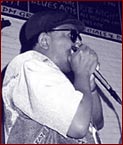 First I need to mention that I am in the musically ignorant category. Professor Harp is a familiar name and long standing favorite among many area Blues fans; however I only saw the Professor for the first time at Mulligan’s Blues House in Brockton, MA this past spring. By the way Mulligan’s is a nice place and very accessible from Boston and Providence.
First I need to mention that I am in the musically ignorant category. Professor Harp is a familiar name and long standing favorite among many area Blues fans; however I only saw the Professor for the first time at Mulligan’s Blues House in Brockton, MA this past spring. By the way Mulligan’s is a nice place and very accessible from Boston and Providence.For those few who have not experienced Professor Harp, a brief description is in order. The Professor is in a word a powerhouse. His singing and harmonica playing are unique while being deeply rooted with earlier Blues masters such as Muddy Waters, Little Walter, George Smith et al. As the old adage goes “All great artists are profoundly influenced by great artists.” That’s just the way it is.
Do you ever get a hankering for Jimmy Reed style blues with the thick, tonal harp that will make the hair stand up on your head and your face all tight? Professor Harp is your man. AtMulligan’s, Professor Harp and his excel-lent band consisting of just bass, drums and guitar intermixed authentic blues with sweet, original soul and gulf coast rock. In addition, the Professor has developed a completely unique tone on the harp (I don’t know how he does it) where the harp sounds just like an organ- a true mouth organ.
If you haven’t seen Professor Harp in a while you owe it to yourself to get out and catch up with what you have been missing.
— Kevin McCarthy is a reader and subscriber to The Blues Audience
www.bluesaudience.com — This article Copyright © The Blues Audience.
September 10, 2001
 Music Review:
Music Review:
Professor Harp’s group is best yet
By JAY N. MILLER Excerpts from The Patriot Ledger
The good Professor and his quartet were in top form Saturday, keeping an enthusiastic weekend crowd at Ricky T’s moving and grooving throughout a 90-minute late set that included r&b, roots rock, funk and updated Chicago blues. The current Professor Harpband is made up of a trio of talented Rhode Island veterans, including James Montgomery band/Young Neal band alumnus Ted Stevens on guitar, bassist Dick Souza and drummer Steve Wennerberg.
But the focal point, as always, is the room-filling harmonica mastery of Holmes himself, who effortlessly shifts from the conventional harmonica to the more complex chromatic version. Holmes has the ability to play chords on the instrument in a manner that crafts sheets of sound, and then contrast it with delicate melody lines, rhythmic forays and frequent use of undertones. Holmes’ baritone vocals are in the style of rougher r&b singers like Wilson Pickett or even Muddy Waters, but his uninhibited whoops, shouts and hollers give the music an immediate visceral impact.
This is the best band we’ve ever seen Holmes front, fromStevens’ rock-edged but tasteful guitar lines to Souza’simpeccably funky bass to Wennerberg’s inventive, often syncopated drums. There are plenty of blues bands working the local circuit, but this one is surely unique.

